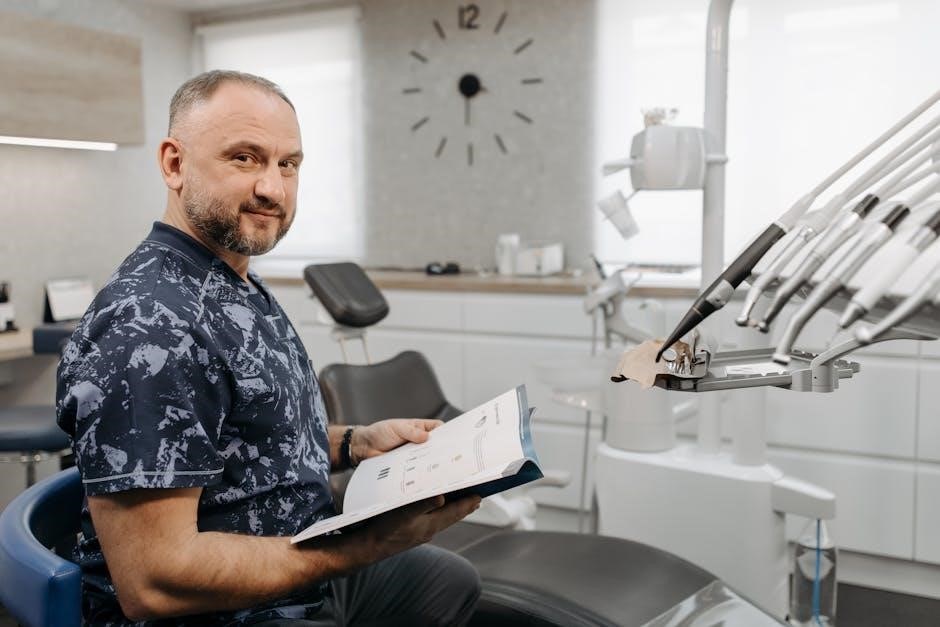Overview of the NYS Notary Practice Exam
The NYS Notary Practice Exam is a licensing requirement assessing knowledge of notary laws, ethical conduct, and state-specific regulations. It includes 40 multiple-choice questions, requiring a 70% passing score. Administered by the New York Secretary of State, it ensures candidates understand their responsibilities as notaries public. Attorneys admitted in New York are exempt from the exam. Resources like practice exams and study guides are available to aid preparation, helping aspiring notaries succeed.
1.1 Importance of the NYS Notary Exam
The NYS Notary Exam is a licensing requirement ensuring candidates understand notary laws, ethical conduct, and responsibilities. Passing the exam demonstrates competence, upholding the integrity of notarial acts. It is crucial for maintaining public trust and ensuring legal compliance. The exam focuses on state-specific regulations, making it essential for aspiring notaries to prepare thoroughly. Proper understanding of the law is vital for performing duties ethically and effectively.
1.2 Purpose of the Practice Exam
The NYS Notary Practice Exam helps candidates assess their knowledge and readiness for the actual exam. It familiarizes them with the format, content, and types of questions, allowing them to identify weak areas for improvement. Regular practice enhances understanding of notary laws and ethical practices, ensuring better performance on the licensing exam and fostering confidence in fulfilling notary responsibilities effectively.

Where to Find NYS Notary Practice Exam PDF Free Download
Downloadable NYS Notary Practice Exam PDFs are available on platforms like Docsity, NotaryPublicHandbook, and NY.gov. These resources offer free access to study materials and practice exams;
2.1 Recommended Websites for Download
Recommended websites for downloading the NYS Notary Practice Exam PDF include Docsity, NotaryPublicHandbook, and NY.gov. These platforms offer free access to updated practice exams, study guides, and resources to aid preparation. Docsity provides the latest versions of the exam, while NotaryPublicHandbook offers comprehensive study materials. NY.gov ensures official and reliable content for aspiring notaries.
2.2 How to Access Free PDF Resources
To access free NYS Notary Practice Exam PDFs, visit official websites like Docsity or NotaryPublicHandbook. Use search terms like “NYS Notary Practice Exam PDF free download” to find resources. Many platforms offer direct downloads after registration. Ensure to verify the source for reliability and updated content. These resources provide sample questions and study guides to help prepare effectively for the exam.

Exam Format and Content
The NYS Notary Exam consists of 40 multiple-choice questions, requiring a 70% score to pass. It covers New York State Notary License Law, duties, ethical practices, and legal procedures. Candidates have one hour to complete the exam, ensuring they understand state-specific regulations and responsibilities. The content focuses on practical applications of notary laws and procedures.
3.1 Structure of the NYS Notary Exam
The NYS Notary Exam is structured as a 40-question multiple-choice test. Each question assesses knowledge of notary laws, ethical practices, and state-specific regulations. The exam is divided into sections covering legal definitions, procedural requirements, and case scenarios. Candidates have one hour to complete the exam, with a passing score of 70%. The format ensures comprehensive understanding of notary responsibilities and legal obligations in New York State.
3.2 Key Topics Covered in the Exam
The NYS Notary Exam covers essential topics such as notary laws, ethical practices, fee schedules, and prohibited acts. It also includes questions on proper document handling, signature verification, and confidentiality. Understanding the New York Notary Public License Law is critical, as it forms the foundation of the exam. Candidates must demonstrate knowledge of legal frameworks and responsibilities to perform notarial duties effectively in the state.
Study Materials and Resources
The NYS Notary Exam requires comprehensive study materials, including official guides, practice tests, and resources from trusted platforms. Utilize the New York Notary Law Primer and Docsity’s practice exams for thorough preparation.
4.1 Best Study Guides for Preparation
Top study guides for the NYS Notary Exam include the New York Notary Law Primer and the New York Notary Public Study Guide, offering detailed explanations of notary laws and ethical practices. Additionally, Docsity provides downloadable PDFs of practice exams, sample questions, and flashcards. These resources ensure comprehensive preparation, covering essential topics like legal terms, notarial duties, and state-specific regulations to help candidates excel on the exam.
4.2 Additional Practice Exams and Tools
Beyond study guides, additional tools like flashcards and video tutorials are available to reinforce learning. Websites such as Docsity offer downloadable PDFs of practice exams and sample questions. These resources provide hands-on experience, helping candidates familiarize themselves with exam formats and timing. Some platforms also offer online courses and interactive quizzes to supplement traditional study materials, ensuring a well-rounded preparation strategy for the NYS Notary Exam.
Frequently Asked Questions About the NYS Notary Exam
Common questions include exam format, required scores, and study materials. The exam features 40 multiple-choice questions, with a 70% passing score. Attorneys admitted in New York are exempt. Resources like practice exams and guides are widely recommended for preparation. Candidates often inquire about exam timing, retake policies, and the importance of understanding the Notary License Law for success.
5.1 Common Queries from Candidates
Candidates often ask about the exam format, the number of questions, and the passing score. They also inquire about study materials, exam timing, and retake policies. Many seek clarification on exemptions, such as for attorneys admitted in New York. Additionally, candidates frequently request sample questions and tips for understanding the Notary License Law, which is central to the exam. These queries highlight key preparation areas.
5.2 Clarifications on Exam Rules and Requirements
The NYS Notary Exam consists of 40 multiple-choice questions, with a 70% passing score required. Candidates have one hour to complete the exam. Attorneys admitted to practice in New York are exempt. The exam focuses on the Notary License Law, and candidates must study the official booklet. Retakes are allowed, but candidates must wait 30 days between attempts. Proper ID and fees are required for exam registration and retakes.
Common Mistakes to Avoid During Preparation
Common mistakes include underestimating exam difficulty, neglecting legal terminology, poor time management, and insufficient practice. Thorough study of the Notary License Law is essential to succeed.
6;1 Pitfalls in Study Strategies
Common pitfalls include relying solely on practice exams without understanding concepts, neglecting to review the NYS Notary License Law, and poor time management. Many candidates rush through study materials or skip over complex legal terminology, leading to gaps in knowledge. Additionally, inadequate practice under timed conditions can result in poor performance during the actual exam, highlighting the need for structured and comprehensive study approaches.
6.2 Errors to Watch Out for on Exam Day
Common errors include misreading questions, poor time management, and overconfidence leading to unchecked answers. Candidates may also misunderstand legal terminology or fail to grasp the nuances of notary laws. Additionally, stress or fatigue can impair focus, causing incorrect responses. It’s crucial to carefully review each question and allocate time to revisit ambiguous answers before submitting the exam.
Sample Questions and Answers
Sample questions include: “What is the fee for changing a notary’s name or address?” Answer: $10. Another example: “Must a notary’s signature certification come from a court?” Answer: No, it does not.
7.1 Examples of Exam Questions
Sample questions include: “What is the fee for changing a notary’s name or address?” or “Is a certification of a notary’s signature required to be issued by a New York State court?” Another example is “Issuing a false certificate is a Class E Felony” or “How many questions are on the NYS Notary Exam?” These questions assess knowledge of notary laws and procedures in New York State. They cover topics like fees, legal requirements, and ethical practices. Additional examples include questions about penalties for misconduct and the role of the Secretary of State in notary appointments. These examples provide insight into the exam’s focus areas.
7.2 Correct Answers and Explanations
The correct answer to “What is the fee for changing a notary’s name or address?” is $10.00. For “Is a certification of a notary’s signature required to be issued by a New York State court?”, the answer is False. “Issuing a false certificate is a Class E Felony” is correct, as per Penal Law 175. These answers align with the NYS Notary License Law, ensuring accurate knowledge of notary practices and legal requirements.
Understanding the NYS Notary License Law
The NYS Notary License Law governs the duties and responsibilities of notaries public in New York. It outlines ethical conduct, legal requirements, and penalties for violations, ensuring transparency and accountability in notarial practices.
8.1 Key Provisions of the Law
The NYS Notary License Law outlines key provisions, including the role of notaries public, ethical standards, and legal penalties for misconduct. It mandates that notaries avoid conflicts of interest, accurately record transactions, and maintain confidentiality. Violations, such as issuing false certificates, can result in criminal charges, including Class E felonies. Compliance with these provisions is essential for maintaining a valid notary commission in New York.
8.2 How the Law Applies to Notary Practices
The NYS Notary License Law governs notary practices, ensuring ethical conduct and legal compliance. Notaries must authenticate signatures, administer oaths, and maintain accurate records. The law prohibits notaries from engaging in fraudulent activities, such as issuing false certificates, which can result in penalties, including fines and loss of commission. Adherence to these regulations is critical for upholding public trust and avoiding legal consequences.
Benefits of Using Practice Exams
Using practice exams enhances knowledge retention, builds confidence, and familiarizes candidates with the exam format. They also identify weak areas, allowing focused study and improved performance.
9.1 Enhancing Knowledge Retention
Practice exams significantly improve knowledge retention by reinforcing understanding of notary laws and ethical practices. Regularly testing oneself helps identify and address weak areas, ensuring a stronger grasp of key concepts. The repetitive nature of practice exams solidifies information in long-term memory, making it easier to recall during the actual exam. This targeted approach enhances overall preparedness and confidence.
9.2 Building Confidence for the Actual Exam
Practice exams play a crucial role in building confidence for the actual NYS Notary Exam. By familiarizing candidates with the exam format and question types, practice exams reduce anxiety and uncertainty. Achieving high scores on practice tests instills self-assurance, enabling candidates to approach the real exam with poise and readiness, ensuring they perform at their best when it matters most.

Tips for Passing the NYS Notary Exam
Thoroughly study the NYS Notary License Law, utilize practice exams, and understand notarial duties. Manage time effectively, answering all questions, and practice consistently to ensure exam readiness and success.
10;1 Effective Study Techniques
Focus on active reading of the NYS Notary License Law, highlighting key sections. Use flashcards for legal terms and concepts. Complete practice exams to familiarize yourself with the format and timing. Review incorrect answers to understand mistakes. Dedicate consistent study time, ensuring thorough understanding of notarial duties and state-specific regulations. Prioritize areas where you score lowest to improve efficiency and confidence.
10.2 Time Management Strategies
Allocate 1.5 minutes per question to complete the 40-question exam in 60 minutes. Skim through the exam first to identify easier questions, answering them quickly to save time for more challenging ones. Practice with timed exams to build speed and accuracy. Regularly review and highlight key sections of the study materials to focus your efforts effectively during preparation.

Final Thoughts and Next Steps
Passing the NYS Notary Exam requires dedication and thorough preparation. Utilize practice exams and study guides to build confidence and knowledge. Upon passing, applicants receive their commission, enabling them to perform notarial duties legally in New York. Stay updated on notary laws and best practices to maintain professional competency.
11.1 Encouragement for Aspiring Notaries
Becoming a notary public in New York is a rewarding step in your professional journey. With dedication and the right resources, such as free practice exams and study guides, you can confidently master the exam. Remember, consistent effort and thorough preparation are key to success. Stay motivated, and soon you’ll join the ranks of trusted notaries serving their communities with integrity and expertise.
11.2 Resources for Further Assistance
For additional support, aspiring notaries can explore resources like the New York Notary Public Study Guide and online courses offering in-depth training. Websites such as Docsity provide downloadable PDF practice exams and study materials. Leveraging these tools ensures comprehensive preparation and a strong understanding of the exam requirements, helping you feel confident and ready to succeed as a notary public in New York.